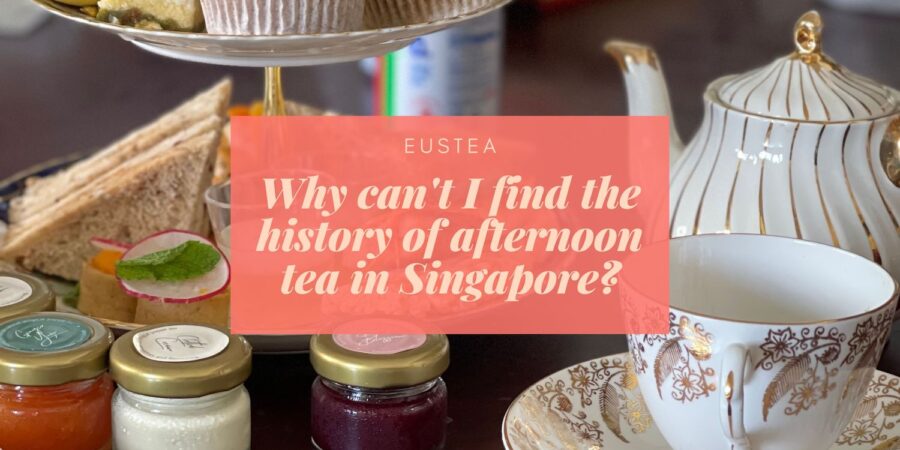For the past two months, I have been intermittently searching the online newspaper and oral archives about the history of afternoon tea in Singapore and documenting my findings on Substack. The motivation was quite simple: I read a book about the history of afternoon tea in various countries and I wanted to do the same for Singapore, but with a focus on how the tea was adopted and developed instead of a general piece on colonialism in Singapore and then adding a few paragraphs about afternoon tea.
Reader, I failed.
These are the facts that I can find:
- The first time the words “afternoon tea” likely appeared in a local newspaper was on 7 June 1892 when a ship named Maria Rickmers docked at Singapore an an afternoon tea on board was expected to be arranged
- On 24 December 1904, it was reported that a preacher who just arrived from the UK was preaching against the habit of gossiping during afternoon tea, which was described as “not a totally unknown institution in Singapore“.
- In 1923, one of the Chinese newspapers talked about a 公共茶缸 (public tea mug), though I’ve not been able to find any information on it or if it’s even related to tea!
- For the Eurasian community in Singapore, it seems like afternoon tea was adopted as part of their lifestyle and adapted as dishes in the meal were substituted with local favourites, much like how their cuisine blended Western and Asian tastes.
- Post-WWII, the British women in Singapore continued the practice of afternoon tea, but it doesn’t look like they influenced the local women who worked for them. Fruits did appear as part of the more substantial version of afternoon tea, while a lighter version consisted of just tea and biscuits/cake.
There is… no way to spin a few facts into a history. I suppose it might be available offline, if I had the time to search and interview people and look through other documents, but for an online effort, this is it. Which is why I wanted to explore the question: why isn’t there more information?
Is it because food isn’t often a subject we think of when we study history?
Or is it because afternoon tea truly was never adopted by the Chinese, Malays, and Indians as part of their lifestyle and was only adopted by the Eurasians? In this case, more interesting questions emerge, such as:
- Is this because Chinese people had a tea culture that resisted change? If so, what about the other ethnic groups?
- We know, from the case of milk tea, that colonialism did contribute to the creation of the drink in different colonies. Why was afternoon tea different?
- Was this a case where the colonial ruling class had so completely separated themselves from the lower, immigrant, classes that there was no way for their lifestyles to influence others? (But the development of Bing Sutt and Cha Chaan Teng in Hong Kong suggests that people might have wanted to emulate the British lifestyle).
- Where did Singapore hotels learn the term “high tea”? Was it due to a belief that high = high class, or was it from the fact that high tea has traditionally been the more substantial meal?
For now, questions remain unanswered. But isn’t it a fascinating subject to think about? I never really quite thought about afternoon tea in this way before and I find that I have so many questions and so many things that I want to look into now.
If I get any more answers, I’ll let you know.

Intriguing quest for answers, Eustacia! People in the future are sure to have so much trouble understanding how certain things are born in certain places with how invasive and powerful the Internet can be. I wonder if you’ll be able to find the answers you seek though. Thanks for sharing!
Yes, I have to remind myself that there’s more than the newspaper and oral history archives! Things like this make me wish I have the resources to investigate further, I think the answers would be quite interesting!
Sounds like a book you should write! No one is better qualified.
If only I could find some interview subjects! And have another 24 hours in everyday for the work haha
[…] Eustacia searches for the history of afternoon tea in Singapore. […]
Very glad I clicked on this. You’re right that food history isn’t given the respect it deserves, although that is maybe changing a little. But happy to learn what I did!
I hope people/academics will start to take food history more seriously – it is fascinating and such an important part of our lives. It can say a lot!
[…] tales and dark fantasy, and whatever strikes her fancy. So check out her stuff like this probe at the history of afternoon tea in Singapore or Let’s Talk About Burning Out and […]
[…] history of tea time in Singapore reveals how this daily ritual evolved from colonial influences and kopitiam culture into a modern, […]